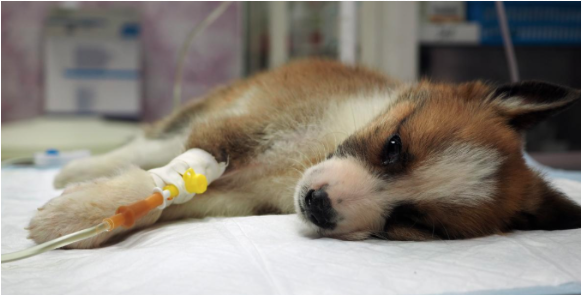Dog paralysis condition linked to eating chicken necks

Feeding dogs raw chicken meat, particularly chicken necks, has been linked to a rare but potentially fatal type of canine paralysis.
A study led by the University of Melbourne’s U-Vet Werribee Animal Hospital found the consumption of raw chicken meat increased the risk of developing the paralysing condition acute polyradiculoneuritis (APN) by more than 70 times.
Project chief investigator Matthias le Chevoir said the cause of APN in dogs had baffled the veterinary community for a long time.
“It is a rare but very debilitating condition where the dog’s hind legs first become weak and then may progress to affect the front legs, neck, head and face. Some dogs may die from the disease if their chest becomes paralysed,” Dr le Chevoir said.
“Most dogs eventually recover without treatment but it may take up to six months or more in some cases. It can be difficult for owners to nurse their pet until the condition gradually improves.
“A better understanding of this condition is therefore very important, so our team was really pleased to have discovered that consuming raw chicken necks is an important risk factor for developing APN.”
Paralysis results from the dog’s immune system becoming unregulated and attacking its own nerve roots, progressively worsening over several days.
APN is the canine counterpart of Guillain-Barré syndrome (GBS) in humans, a condition that also causes muscle weakness and may require ventilation if chest muscles are affected.
Dr le Chevoir said the bacteria Campylobacter was now considered a triggering agent in up to 40 per cent of GBS patients, which may be present in undercooked chicken, unpasteurised milk products and contaminated water.
“Our team at U-Vet Animal Hospital wanted to understand if consuming raw chicken could also be triggering APN in dogs. Many of our team have previously worked overseas and know that a raw meat diet is less common there, so were intrigued by this potential connection,” Dr le Chevoir said.
The team studied 27 dogs with symptoms of APN and 47 dogs without, examining physical symptoms and interviewing the owners about recent behaviours and diet; focusing on the consumption of raw chicken meat.
The study’s lead author Dr Lorena Martinez-Anton said that when they examined faecal samples collected within seven days of clinical signs of APN appearing, they were 9.4 times more likely to have had a Campylobacter infection than the control group without APN.
“We predict that the microbe Campylobacter is likely to be the reason for the dysregulation of the dog’s immunity and therefore, the symptoms of paralysis,” Dr Martinez-Anton said.
“These bacteriological results were consistent with the hypothesis that the uncooked chicken meat was the source of the Campylobacter and as a result, triggered APN.
“We find smaller dog breeds are fed more chicken necks as they can’t eat larger bones.
In humans, it is proposed that the Campylobacter bacteria, which is commonly isolated from commercial poultry products, contains molecules similar in structure to part of the nerve cell. This similarity confuses the immune system which attacks the body’s own nerves, resulting in paralysis.
Drs Martinez and le Chevoir said the fact that raw meat consumption could trigger such dramatic disease is concerning as there currently appears to be a growing trend for feeding dogs raw meat diets.
“A significant association is also found between APN and smaller dog breeds. Based on our clinical experience this seems to be because smaller dogs are more likely to be fed smaller bones like chicken necks,” the doctors said in the research paper.
“We would recommend that owners choose regular dog food rather than chicken necks until we know more about this debilitating condition.”
Full study can be found at:
http://onlinelibrary.wiley.com/doi/10.1111/jvim.2018.32.issue-1/issuetoc
L. Martinez-Anton, M. Marenda, S.M. Firestone, R.N. Bushell, G. Child, A.I. Hamilton, S.N. Long and M.A.R. Le Chevoir. Investigation of the Role of Campylobacter Infection in Suspected Acute Polyradiculoneuritis in Dogs. Journal of Veterinary Internal Medicine, 2018, Volume 32, Issue 1, pages 352–360. DOI: 10.1111/jvim.15030
Read more on Pursuit.